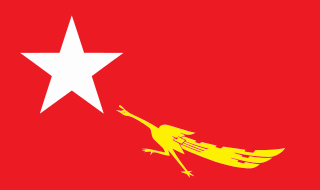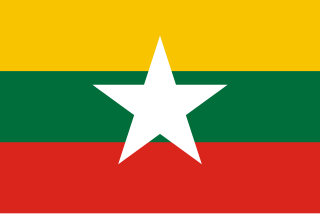
Aung San Suu Kyi, sometimes abbreviated to Suu Kyi, is a Burmese politician, diplomat, author, and a 1991 Nobel Peace Prize laureate who served as State Counsellor of Myanmar and Minister of Foreign Affairs from 2016 to 2021. She has served as the chairperson of the National League for Democracy (NLD) since 2011, having been the general secretary from 1988 to 2011. She played a vital role in Myanmar's transition from military junta to partial democracy in the 2010s.

Myanmar operates de jure as a unitary assembly-independent republic under its 2008 constitution. On 1 February 2021, Myanmar's military took over the government in a coup, causing ongoing anti-coup protests.
The history of Myanmar covers the period from the time of first-known human settlements 13,000 years ago to the present day. The earliest inhabitants of recorded history were a Tibeto-Burman-speaking people who established the Pyu city-states ranged as far south as Pyay and adopted Theravada Buddhism.

The National League for Democracy is a liberal democratic political party in Myanmar (Burma). It became the country's ruling party after a landslide victory in the 2015 general election but was overthrown in a military coup d'état in early 2021 following another landslide election victory in 2020.

Myanmar is a unitary republic, with elected representatives at the national and, state or region levels. On the national level, the head of state, the President, is elected indirectly through an Electoral College. According to the 2008 constitution, the term durations of the legislature, the President, and the Cabinet are five years. All elections are regulated by the Union Election Commission.

The National Coalition Government of the Union of Burma was an administration which claimed to be the government in exile of Burma (Myanmar). It had its headquarters in Rockville, Maryland, United States. It was formally established in December 1990, with Sein Win as its first prime minister. It was dissolved in September 2012.

The Irrawaddy is a news website by the Irrawaddy Publishing Group (IPG), founded in 1990 by Burmese exiles living in Thailand. From its inception, The Irrawaddy has taken an independent stance on Burmese politics. As a publication produced by former Burmese activists who fled violent crackdowns on anti-military protests in 1988, it has always been closely associated with the pro-democracy movement, although it remains unaffiliated with any of the political groups that have emerged since the 8888 Uprising.

The president of the Republic of the Union of Myanmar is the head of state and constitutional head of government of Myanmar. The president chairs the National Defence and Security Council and normally leads the Cabinet of Myanmar, the executive branch of the Burmese government, though the military prime minister leads the cabinet under the current state of emergency. The current president is Myint Swe, who assumed the presidency in an acting capacity through a military coup d'état on 1 February 2021. Though a constitutionally powerful position, the presidency is a largely symbolic post under the current military government, with Myint Swe appearing only to rubber-stamp military rule.

General elections were held in Myanmar on 7 November 2010, in accordance with the new constitution, which was approved in a referendum held in May 2008. The election date was announced by the State Peace and Development Council (SPDC) on 13 August.

A constitutional referendum was held in Myanmar on 10 May 2008 according to an announcement by the State Peace and Development Council in February 2008. According to the military government, the new Constitution of Myanmar will ensure the creation of a "discipline-flourishing democracy". Multi-party elections followed in 2010.

The Constitution of the Republic of the Union of Myanmar is the supreme law of Myanmar. Myanmar's first constitution adopted by constituent assembly was enacted for the Union of Burma in 1947. After the 1962 Burmese coup d'état, a second constitution was enacted in 1974. The country has been ruled by military juntas for most of its history.

The Pyithu Hluttaw is the de jure lower house of the Pyidaungsu Hluttaw, the bicameral legislature of Myanmar (Burma). It consists of 440 members, of which 330 are directly elected through the first-past-the-post system in each townships, and 110 are appointed by the Myanmar Armed Forces.

The 2011–2020 Myanmar political reforms were a series of political, economic and administrative reforms in Myanmar undertaken by the military-backed government. These reforms include the release of pro-democracy leader Aung San Suu Kyi from house arrest and subsequent dialogues with her, establishment of the National Human Rights Commission, general amnesties of more than 200 political prisoners, institution of new labour laws that allow labour unions and strikes, relaxation of press censorship, and regulations of currency practices. As a consequence of the reforms, ASEAN has approved Myanmar's bid for the chairmanship in 2014. United States Secretary of State Hillary Clinton visited Myanmar on 1 December 2011, to encourage further progress; it was the first visit by a Secretary of State in more than fifty years. United States President Barack Obama visited one year later, becoming the first US president to visit the country.

The 2012 Myanmar by-elections were held on 1 April 2012. The elections were held to fill 48 vacant parliamentary seats. Three of those remained vacant as polling in three Kachin constituencies was postponed. There was no plan to fill the additional five seats cancelled in the 2010 election and one seat vacated after the decease of a RNDP member.

General elections were held in Myanmar on 8 November 2015, with the National League for Democracy winning a supermajority of seats in the combined national parliament. Voting occurred in all constituencies, excluding seats appointed by the military, to select Members of Assembly to seats in both the upper house and the lower house of the Assembly of the Union, and State and Region Hluttaws. Ethnic Affairs Ministers were also elected by their designated electorates on the same day, although only select ethnic minorities in particular states and regions were entitled to vote for them.
T Khun Myat is a Burmese politician, lawyer and Speaker of the Union Assembly, the Joint House and Pyithu Hluttaw, the lower house of the Myanmar parliament. In both 2010 election and 2015 election, he contested and won the Kutkai Township constituency for a seat in the country's lower house.

The Constitution of the Republic of the Union of Myanmar (2008) is the third Constitution of Myanmar after 1947 and 1974 constitutions which lost force after military coups. It is part of the seven steps road map announced by then Prime Minister of State Peace and Development Council government General Khin Nyunt on 30 August 2003. One of the seven steps include recalling the National Convention for the drafting of new constitution. The National Conventions was adjourned on 31 March 1996 by State Law and Order Restoration Council government.

General elections were held in Myanmar on 8 November 2020. Voting occurred in all constituencies, excluding seats appointed by or reserved for the military, to elect members to both the upper house - Amyotha Hluttaw and the lower house - Pyithu Hluttaw of the Assembly of the Union, as well as State and Regional Hluttaws (legislatures). Ethnic Affairs Ministers were also elected by their designated electorates on the same day, although only select ethnic minorities in particular states and regions were entitled to vote for them. A total of 1,171 national, state, and regional seats were contested in the election, with polling having taken place in all townships, including areas considered conflict zones and self-administered regions.

In Myanmar's next general election, voters are expected to elect representatives to both the Amyotha Hluttaw and the Pyithu Hluttaw of the Assembly of the Union. The planned election would be the first after the 2021 military coup d'état. Though the military junta, the State Administration Council, initially promised to hold the election by August 2023, it has since indefinitely delayed the election in the face of increasing violence.

Indirect presidential elections were held in Myanmar on 15 March 2016, after the 2015 general election. Members of the Assembly of the Union voted for the country's President, and two Vice-Presidents.






